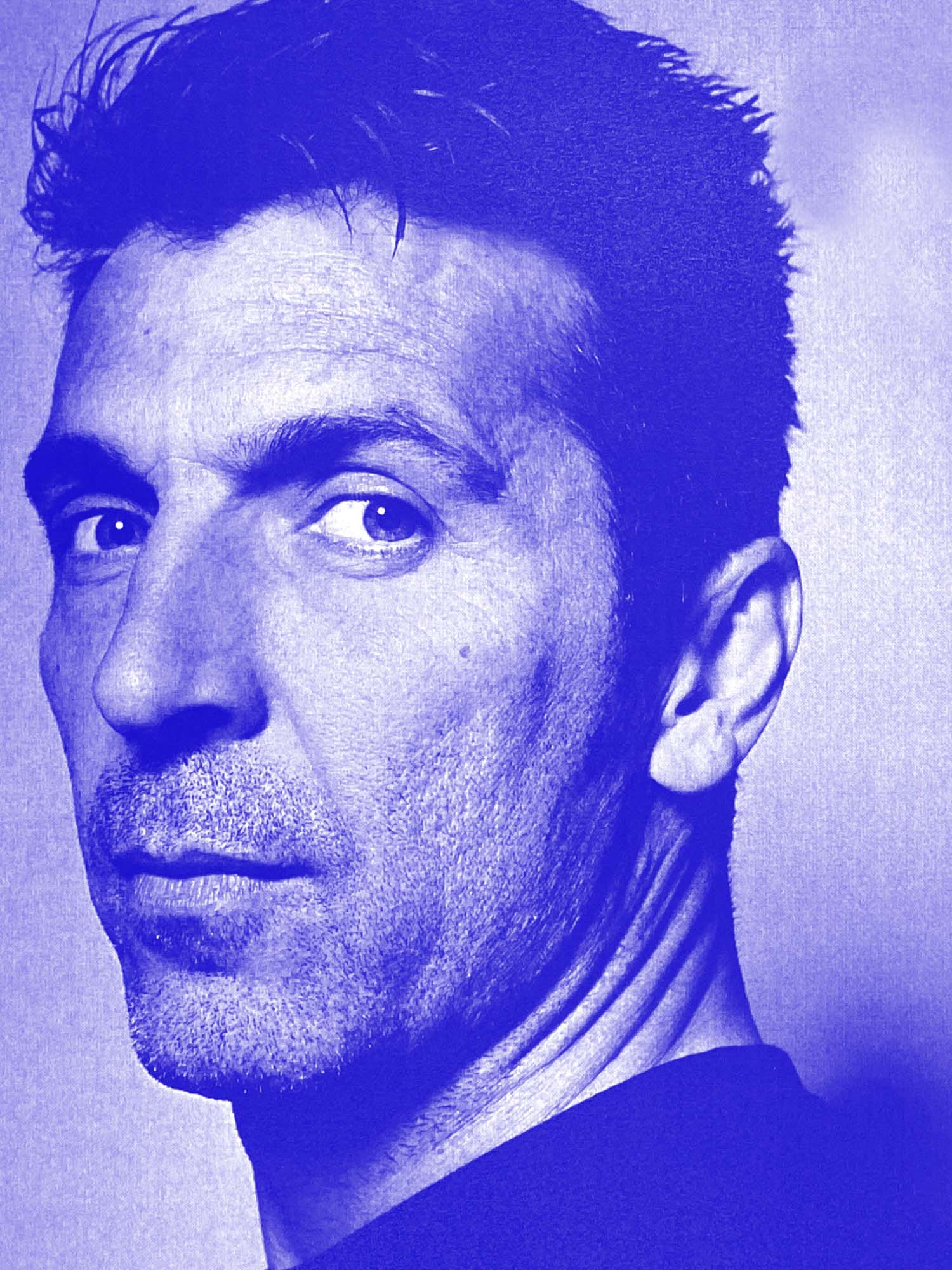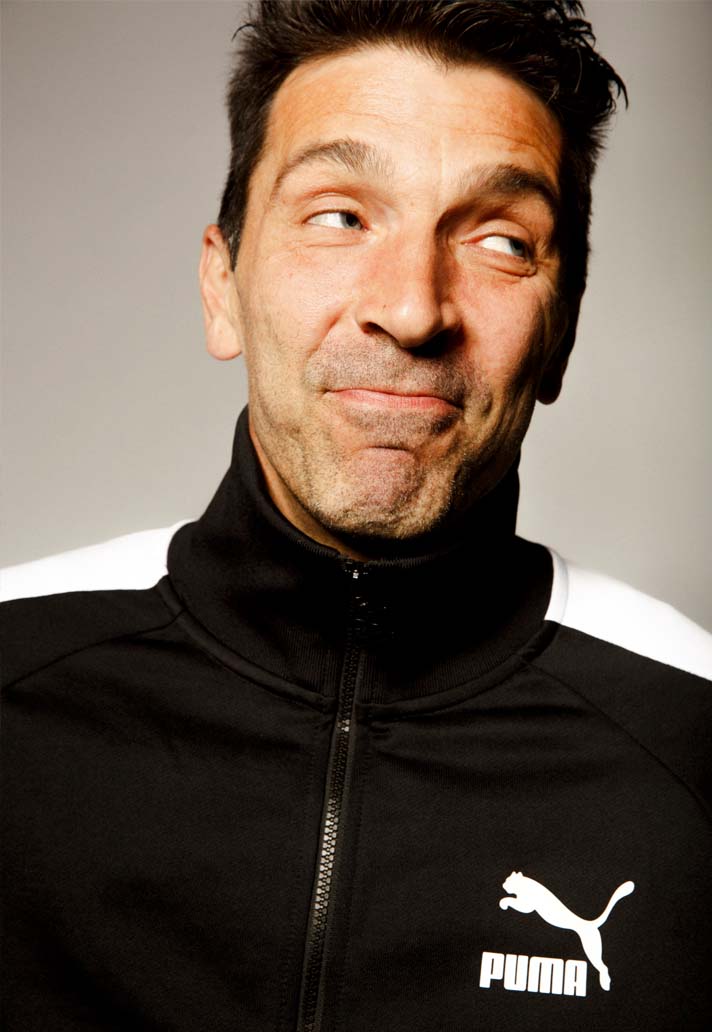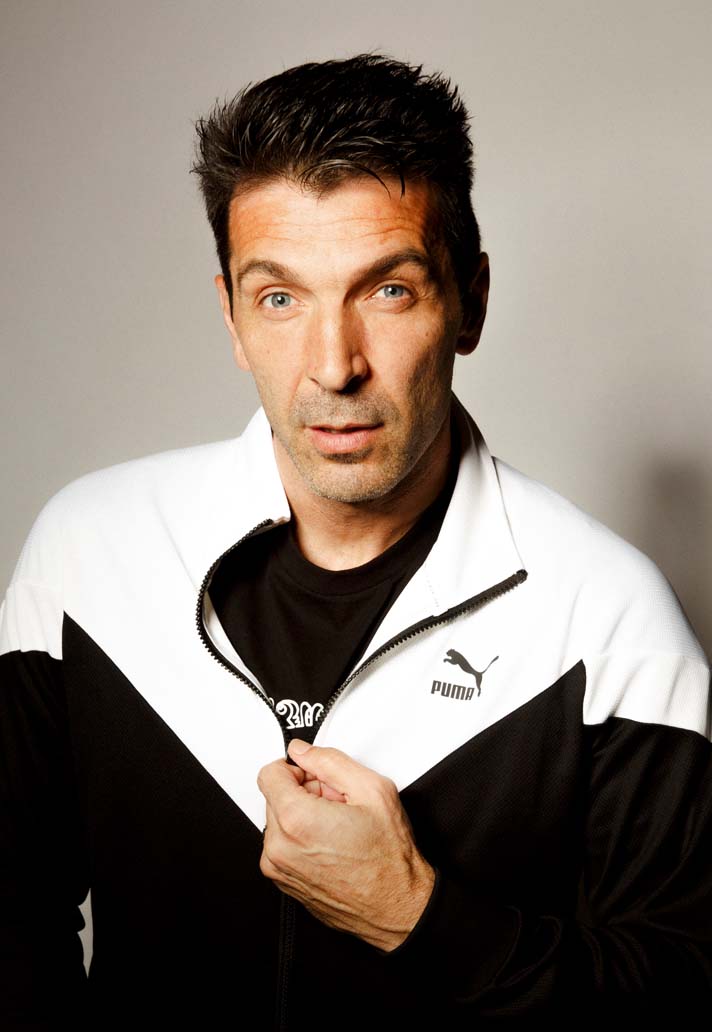When rounding up the roster of names for the ‘Utopia’ issue of our new special edition print publication, SoccerBible Volumes, one name just had to be in there. A man who has seen it all; who has achieved so much and yet refuses to bow to the rigours of time. Talk of a footballing Utopia, and this guy would be standing guard at the gate, right between the posts, where he always belongs. That man? The one and only Gigi Buffon…
Icon. In every most poignant sense. Gianluigi Buffon is one of football’s greatest, most outstanding contributors. Decorated as well as decadent, he’s seen everything that football offers and has owned every moment. Highs, like only few have conquered, and a journey of supreme triumph, we hang on his words, in his Torino garden, gawping. Like a gift from him to us and you, here are his words.
You’ve achieved so many remarkable things in your career. If you could use three words or a sentence, how would you describe your journey through football?
My journey through football has been one of continuous discovery that has allowed me to remain enthusiastic and stimulated to achieve new goals, goals that I often set myself.
If you had to describe it in three words, which would you choose and why did you pick those words?
If I had to choose three words, (my career) has been something thrilling, extraordinary – because it was definitely something not ordinary – and special.
Have you ever taken a moment to think about all you have contributed to the game, the pride you have brought to the game? You must be proud of your legacy?
No, I have never thought about it because I've always been humble enough to think that it has been football that did so much for me. And when I say football, I don’t mean the world of football but the game itself. And I am fully aware of this because I always carry with me that 20% of my youth. With that youth I carry with me the thoughts and feelings of young Gigi, and these have always helped me.
When you came into the game, can you remember what teenage Buffon dreamed of?
When I started with my career, young Buffon hoped to be able to become a good goalkeeper of a professional league, Serie C and that would have made me happy. But I went beyond my expectations and this means that in life, while you can, you need to push forward and don’t impose yourself limits.
You've clearly reached those dreams and then beaten them – which have been the most character defining moments for you?
The most defining moments of my career have been, well for sure my debut in Serie A, as it was something that made me tingle. By this I mean that I had this no longer manageable desire of making myself known and to show who was Buffon the goalkeeper. I kept trying to cool my heels and then this sensational opportunity arrived with AC Milan and that made me feel satisfied.
Did you ever face any doubters as a child? Did anyone ever tell you that you would never make it as a professional?
No, as a child I never doubted the career I could have. I grew up in a sport-oriented family and as a result I was never delusional. Growing up, my parents, especially my dad, kept a close eye on me and without being too critical he tried to make me understand how important it was to pretend a lot from yourself if you can, and if you have it in you.
This stayed with me and often during my career – and I’m not saying this to be presumptuous but to be realistic – I never needed to read the papers or listen to the fans to know if I was happy with myself. I already knew that. As a matter of fact, often, 80% of times I would leave a match without being satisfied with my performance or with the goals conceded. This I believe it’s quite telling about a certain way of approaching your work. Always chasing perfection, never feeling satisfied and contented.
When you think back to those very early days, if you could speak to yourself at 16/17/18 years old, what do you think you would tell yourself?
I often think about the person I was and I have to say that being the person I was, with that outlook in life, it really helped me through the first years of my career and to then develop into the person I have become. To gain acceptance, even with a certain level of arrogance, but I had to send a signal, especially to the older ones, those with more experience that feel like they always have to belittle the younger ones. I had an almost scientific approach of someone that cared little, even disrespectful and irreverent to an excess but that was my way to say, I am at least as worthy as you are, let’s start with this and let’s see where this will go.
You are greatness, defined. You are an icon. What makes greatness for you?
Truth be told, it even makes me feel uncomfortable when I hear the word greatness because I don’t feel like one of the great ones. I do feel like an icon. It is inevitable, with my role, I do feel like I have achieved something great. Great as a footballer, as a man, I believe these things to be one. I never aimed to be a great footballer or a great man, it is up to others to say what type of man and footballer you’ve been. To say that of yourself, to say this to yourself it’s not a good thing.
I’ve often been small. I have made the kind of mistakes that great men don’t make but I also feel that in order to become a great man, there are milestones you need to hit. You need to make mistakes and pay for your own mistakes. And one of the most beautiful things about my life is that I paid for every single mistake I have made, every single one, and I suffered the consequences directly and, while I am not proud of the mistakes I made, these helped me grow a lot. This has developed in me a sense of decency and shame, because when you make a mistake your name is dragged in the mud by newspapers, often for what I think were injustices and instances from my private life that should have stayed private, other times for things that were rightly reported. In my opinion, to feel ashamed means that you have it within you to improve yourself as you don’t wish to feel that again and this is a good thing.
Who were your icons growing up?
There have been many icons in my youth, many, and as these days we often talk about the football of the people, a romanticised version of football, I won’t speak my mind until this will be asked to me directly. I think as a child I was the classic youth who idolised a romanticised version of football. My number one icon was Thomas N’Kono, Cameroon’s Goalkeeper, and not for example Germany’s or Brazil’s goalkeeper or a goalkeeper from the most renowned teams. The football team I looked up to after Italy was Cameroon.
My favourite football team as a child, the one I supported, was Genoa. The football I followed was a less prestigious one at the time, like Campobasso, Pescara, Taranto and Avellino. So I can tell you about Slišković from Pescara, who you wouldn’t know who it is, Ciappi of Campobasso, Dirceus and Juary or Barbadiglio of Avellino, who really excited me when I was a child, and that’s why I feel like I am the product of this romanticised version of football and that’s why at times I feel I am entitled to say whether something is right or not.
I don’t believe many people within football have started with a more romanticised basis. For example, I stayed with Juventus in Serie B, I took a pay cut and remained in Serie B, while usually when you move to Serie B you ask for it to be triplicated when I actually took a pay cut. So, when it comes to certain topics, I can honestly say I can speak my mind loud and clear, but I don’t or otherwise it always feels like I’m being a Contrary Mary.
Who have you found inspiration from as you’ve gone through your career? Who have been your biggest role models?
In terms of inspiration, Thomas N’Kono was certainly my role model, then Schmeichel from Denmark, especially the first one, then all the Italian keepers because in the end the Italian school, in my opinion, has been the best. I’m talking of for example of Zoff when I was a little child even though then I didn’t really understand much, Giovanni Galli, Tancredi, Zenga, Tacconi, Marcheigiani, Peruzzi, Pagliuca, Toldo, Bucci, they’ve all been goalkeepers of a very high level.
Not everything is perfect along the way – how did you cope and who helped you through the low points, when they happened?
No, luckily nothing ever goes smoothly in life because if it did, you wouldn’t appreciate the best moments. They wouldn’t exist. Everything would be bland. It’s actually a good thing to have something go wrong at times, it stimulates you as a person and pushes you to find a way within you to emerge from certain complications. This then becomes life experience that you will always carry with you and that on an existential level will give you strength and will often help you feel at the centre of the universe. And this is a man’s true victory, when he will always feel good, even in different places.
Going back to this, for me the adventure in Paris has been a wonderful experience from this point of view as well. It gave me some certainties as a man that I didn’t have before and that I didn’t know I had. It was a truly beautiful experience.
Away from football, who do you look at as aspirational figures?
I don’t really have aspirational figures apart from maybe people that are no longer with us and haven’t been in a long time, people that have written books and other things, that I like to read over and over to better understand certain reasoning. Among these there are three or four main ones, but I don’t like to mention them because, as most extraordinary figures, these are controversial people and I would like for them to be able to rest in peace.
Would you say that even though you’ve achieved so much, that you’re always learning?
Of course, one of the things that makes me happy is this continuous evolution of the world of football, including the rules for goalkeepers. This has helped me to not get bored. I really like this continuous evolution because I find it stimulating and that’s all I need: stimulation. I need stimulation and to put my head to work and to have new obstacles to overcome. This is vital for me.
All the trophies, all the medals, all those precious international appearances – what moments will you never forget?
Well, winning the world cup. For me as a footballer, as a man, for the child I was, it’s something that I honestly couldn’t even have imagined in my wildest and biggest dreams to be able to achieve. It was such a big moment that I struggled the day before, during and after the match to be fully aware of what we had achieved. It’s something you ever only thought possible in the world of dreams, that I never thought could become reality.
Having achieved this makes you feel proud and special, but also uneasy at the same time because you tell yourself that, at the end of the day, you are a man like many – which I still am – but I was able to achieve something outstanding for us as an achievement in the world of football, but also for the joy and feelings that you were able to evoke in people. This is our greatest power.
What are the not so obvious moments of greatness throughout your career? For example, winning the World Cup is remarkable but what moments really meant so much to you? Seeing your family for the first time after winning the world cup must have been hugely emotional?
Yes, to see my family, my dad, my mum, my sisters and brothers in law, their children, my children, no wait, they hadn’t been born yet! It’s a strong feeling because at the end of the day, they suffer three times more. They suffer as a fan, as someone who has a relationship with the footballer on the pitch, and as of someone who’s related to the goalkeeper, which is different from being a midfielder, or a striker. A parent or a relative who has a brother or a son who’s a keeper, with all the responsibilities involved with the role, is something, in my opinion, grueling. Why? Because often, there’s more to lose. Unfortunately, a mistake made by you has a negative impact on the whole game, results or the final of the World Cup.
Can you imagine if we had lost the World Cup final 0-1 against France because of a mistake I made? That’s what I mean by the “importance” of some games, that if you were fully aware you wouldn’t probably even be able to enter the pitch. You would tell yourself, but why? If I make a mistake today, if I miss the ball and we lose the World Cup, that’s what everyone would remember about me for the rest of my life. It’s something so big, so unusual that goes beyond being human. So, think about a parent watching a match like this one, what state they might be in while watching it, nearing a heart attack.
Have you kept mementos from major moments along the way?
I kept some, yes. For example, the shirt from the World Cup, but mostly from my later years. I have a few special shirts from the last couple of years. I even made a record of them because my memory is one of my weakest points. I need to write everything down, otherwise I forget everything within 10 minutes. I must say I read somewhere that a very clever person said intelligent people are those with the worst memory, which I found very comforting (laughs). You see, it’s a way of always trying to find a silver lining.
How important are these mementos?
They are not very important. I must admit I collect them mostly for my children, my parents and to show respect for my own story in the world of football but often you almost become a slave to all these mementos. To the point that you are almost tempted to throw them away to set yourself free. So, what do you do when this happens? In my case, I gave most of them away to the Juventus Museum so at least people can see them and feel happy and you do something socially useful and important. It’s a bit like having a beautiful painting. It’s nice to have one in your home but after a while you feel it would be nice to share it with others, because at the end of the day, what do you do with it every day? Its beauty is an end in itself and it’s better to share the beauty of certain objects.
What moments changed your life in your career?
A career is such a long period of time that you don’t really have just a few crucial moments. Certainly, during a career like mine, a decisive moment was when I started because if you get the beginning wrong, yes, you’ll still have a great career, but it will take longer. In my case though, I had such a strong beginning that this allowed me to make it right away.
When you think about those great moments. From your viewpoint on the pitch – how much have you enjoyed being able to play with some of the greatest talents to have ever played the game?
It has been incredibly beautiful being able to live firsthand such moments. I’m more interested in people than players. I am more impressed by the goodness of people and I was lucky to have the chance to play with incredible champions and with champions that were also exceptional men and that’s what I enjoyed the most.
Who have you watched while playing that you have most been in awe of?
Looking at my career, I can’t choose one single player that made an impact, because it spanned for such a long time and at such level that I could name at least thirty. Let’s try to shorten this list to ten. The first who really made an impact was Ronaldo, playing for Inter Milan, he was like an alien playing on Earth, he was out of this world. Then Zidane, as well as Roberto Baggio, and then, talking about Italian players, Baggio, Totti, Del Piero and Cassano. He was also up there. And you must mention someone like Pirlo, a true great.
I can’t really name any defender because there would be hundreds. For me people like Cannavaro, Thuram, Chiellini, Barzagli, Bonucci, Nesta, Maldini they’ve also made my fortune. Looking at who was playing on the other side, Messi, Ronaldo, Cristiano who is now playing for Juventus, Iniesta because to me he was something spectacular, Xavi. I’m sorry because I know there are many more but as I told you, my memory isn’t great. I’ve missed hundred more of amazing ones.
Being such an icon for so many generations has been something you’ve given the game. How would you like to think you have changed the game or helped it for the next generation?
Yes, I might have been an inspiration in making certain choices, as in the past it was very rare to see young keepers debut the same way I did. Later there has been a period where this happened more frequently, if not almost too often. I believe I have become more of a point of reference now, as I still play at 43 at what I think it’s still a high performing level, I think this is upsetting many. As you would expect it. While for those who have a different mind set and want to improve themselves, I have become a benchmark, as to say that nothing is impossible in life.
How much do you think about that next generation of goalkeeper? How has the position changed from when you started to now?
Yes, I do think about it sometimes. If we think about future goalkeepers, we could easily think of them as playmakers or midfielders with the ability to save protect their goals. We could say that the specifics of the role are changing, and loosening compared to what we perceive as the role of the goalkeeper. The role is evolving, and I can’t deny this means that it’s also becoming a more complete one. It can do more and as a result keepers are gaining a different strategic vision and are required to improve their footwork, and this is something I am living firsthand. This though I believe it means that we will witness less and less of those extraordinary saves.
People always say goalkeepers think slightly differently – how would you describe your mindset?
I don’t know what other keepers think. I know what I think, and I think the contrary of everything. There are days when I think I can still be playing in the Coppa Campioni at 55 and days when I think that I will quit within in a month. And it’s this continuous going back and forth in my thoughts that has never allowed me to stand idle or become bored. This gives me a reason to never give up, to stay alive and connected to what I do.
Then I can say that something that does me good is my being ironic and self-deprecating. I can laugh at myself and I don’t even need an audience for that (laughs). At times I’m in front of the mirror and tell myself something that makes me laugh and think I might be a bit crazy. But this also my strength. If it wasn’t for my self-deprecation and positive outlook everything would be much harder and heavier, and I wouldn’t be able to do what I do.
When you think of your mindset, what has made you so driven to succeed?
I think my mindset has evolved with time and I even grew angry at myself because I wasn’t satisfied. I felt I had and have the skills and qualities needed to become the best and be remembered as such, and this is such a rare gift. If you can’t understand this yourself and don’t do everything in your power to make it happen, I’m not saying you’ve failed but it means you settled. If you settle this means you’re not up for a fight, you’re not eager to do what it takes and suffer. At the end of the day, this is also what life is about and, in my life, you can find all of this.
How much is football as much about mental strength as much as physical?
For sure the physical element is vital and important but when I think that I’ve now been playing for 26 years, I must admit that what made me stand out from the rest is my mental strength. This is undeniable. In my career I have seen goalkeepers with better physical qualities, stronger legs, better reflexes but you need to have the right disposition. There are many factors that influence why some remain where they are while others make it.
What are you most grateful for that football has given you?
I am grateful because it has made me a happy man. Because it did not let me age, because apart from the way I look – even though I still feel young, I still feel like I have that energy inside me, that enthusiasm, that healthy dose of insanity of a boy, at least in part. And when you have this type of energy and feelings inside you, you live your life well.
Photography by Stefano Carloni
Pick up a copy of SoccerBible 'Volumes' – Summer ‘21 ‘Utopia’ Edition exclusively at prodirectsoccer.com























